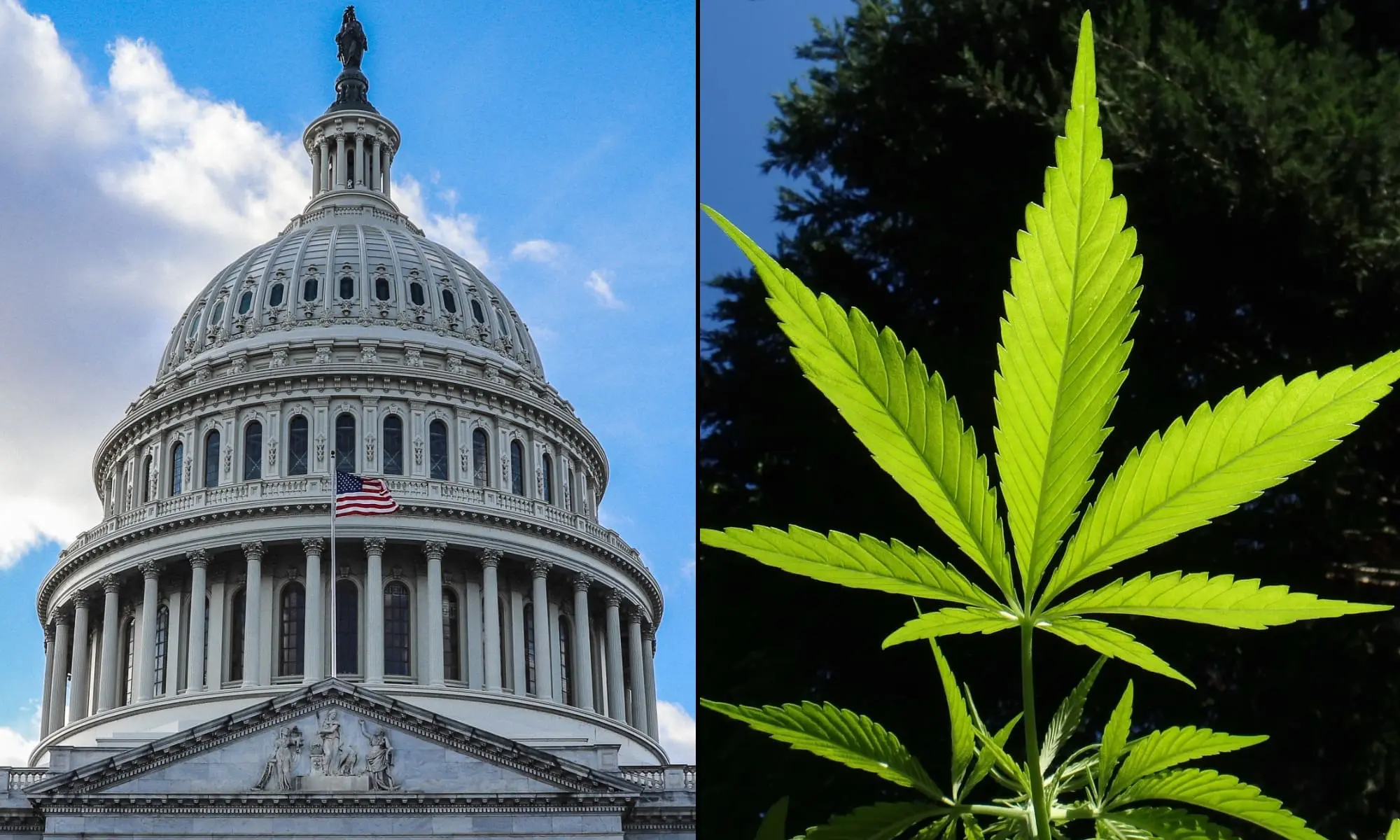Politics
Congressional Deal Would Ban Many Hemp THC Products, While Excluding Provisions To Let VA Doctors Recommend Medical Marijuana

Newly released spending legislation negotiated by congressional leaders would federally recriminalize many hemp-derived products. It also excludes provisions previously passed by the House and Senate that would have allowed Department of Veterans Affairs (VA) doctors to begin issuing medical marijuana recommendations to their patients.
The new measure, if enacted into law, would ban certain hemp products that were legalized under the 2018 Farm Bill signed into law by President Donald Trump during his first term.
The negotiated bill “prevents the unregulated sale of intoxicating hemp-based or hemp-derived products, including Delta-8, from being sold online, in gas stations, and corner stores, while preserving non-intoxicating CBD and industrial hemp products,” a summary published on Sunday by the Senate Appropriations Committee says.
Under current law, cannabis products are considered legal hemp if they contain less than 0.3 percent delta-9 THC on a dry weight basis.
The new legislation specifies that, within one year of enactment, the weight would apply to total THC—including delta-8 and other isomers. It would also include “any other cannabinoids that have similar effects (or are marketed to have similar effects) on humans or animals as a tetrahydrocannabinol (as determined by the Secretary of Health and Human Services).”
The new definition of legal hemp would additionally ban “any intermediate hemp-derived cannabinoid products which are marketed or sold as a final product or directly to an end consumer for personal or household use” as well as products containing cannabinoids that are synthesized or manufactured outside of the cannabis plant or not capable of being naturally produced by it.
Legal hemp products would be limited to a total of .4 milligrams of total THC or any other cannabinoids with similar effects.
Within 90 days of the bill’s enactment, the Food and Drug Administration (FDA) and other agencies would need to publish list of “all cannabinoids known to FDA to be capable of being naturally produced by a Cannabis sativa L. plant, as reflected in peer reviewed literature,” “all tetrahydrocannabinol class cannabinoids known to the agency to be naturally occurring in the plant” and “all other know cannabinoids with similar effects to, or marketed to have similar effects to, tetrahyrocannabinol class cannabinoids.”
The deal was agreed to by Senate Appropriations Committee Chair Susan Collins (R-ME) and Sen. Patty Murray (D-WA), the ranking minority member on the panel, as well as House Appropriations Committee Chair Tom Cole (R-OK). But Rep. Rosa DeLauro (D-CT), the top Democrat on the House panel, did not sign off.
The language slightly differs from provisions included in legislation that had previously advanced out of the House and Senate Appropriations panels, which would have banned products containing any “quantifiable” amount of THC, to be determined by the HHS secretary and secretary of agriculture.
Jim Higdon, co-founder of the company Cornbread Hemp, said the Senate Appropriations Committee’s summary describing the bill as preserving the legality of non-intoxicating CBD products is a “lie.”
The “0.4mg limit will make 100 percent of Cornbread Hemp products illegal, including our full spectrum CBD products, topical CBD products, and even CBD oils,” he told Marijuana Moment, suggesting that the language was included at the behest of the alcohol industry, which he said does not want to compete with hemp-derived THC beverages.
The legislation will “kill the $30 billion hemp industry and the 400,000 jobs that go along with it,” Higdon said in a separate press release. “This is a dark day for anyone who hopes for a future when cannabis is descheduled in America. If we can’t keep full spectrum CBD products legal, then future of cannabis reform seems even more distant with an emboldened alcohol industry that now has a proven playbook for killing cannabis.”
But Chris Lindsey, director of state advocacy and public policy, for the American Trade Association of Cannabis and Hemp (ATACH), said that his group supports the language, calling it a “critical step to clarify Congress’s intent in the 2018 Farm Bill.”
“Willful misinterpretation of the Farm Bill led to the proliferation of unregulated synthetic THC products widely available for sale to minors,” he argued. “The bill clearly distinguishes between intoxicating and nonintoxicating products, synthetic and natural products, and industrial and consumer products. These distinctions create regulatory lanes for hemp-derived products and address perceived loopholes.”
Luke Niforatos, executive vice president of the prohibitionist organization Smart Approaches to Marijuana (SAM) also cheered the ban.
“This is a titanic victory for public health, safety, and, importantly, children across America harmed by these dangerous drugs,” he said in a post on X.
Veterans Medical Cannabis Provisions Left Out Of Bill
Separately, the newly released appropriations legislation excludes language that had been passed by either chamber earlier this year to let VA doctors recommend medical cannabis to their military veteran patients in states where it is legal.
The House and Senate adopted slightly different provisions on the issue.
Here’s the text of the House version:
“None of the funds appropriated or otherwise made available to the Department of Veterans Affairs in this Act may be used to enforce Veterans Health Directive 1315 as it relates to—
(1) the policy stating that ‘VHA providers are prohibited from completing forms or registering Veterans for participation in a State-approved marijuana program’;
(2) the directive for the ‘Deputy Under Secretary for Health for Operations and Management’ to ensure that ‘medical facility Directors are aware that it is VHA policy for providers to assess Veteran use of marijuana but providers are prohibited from recommending, making referrals to or completing paperwork for Veteran participation in State marijuana programs’; and
(3) the directive for the ‘VA Medical Facility Director’ to ensure that ‘VA facility staff are aware of the following’ ‘[t]he prohibition recommending, making referrals to or completing forms and registering Veterans for participation in State-approved marijuana programs’.”
The Senate language reads:
“None of the funds appropriated or otherwise made available to the Department of Veterans Affairs in this Act may be used in a manner that would—
(1) interfere with the ability of a veteran to participate in a medicinal marijuana program approved by a State;
(2) deny any services from the Department to a veteran who is participating in such a program; or
(3) limit or interfere with the ability of a health care provider of the Department to make appropriate recommendations, fill out forms, or take steps to comply with such a program.”
The negotiated bill released on Sunday contains no language on the issue at all.
In past years, both the House and Senate had included provisions in their respective MilConVA measures that would permit VA doctors to make the medical cannabis recommendations, but they have never been enacted into law.
The new appropriations legislation is part of a three-bill package to fund various federal agencies for Fiscal Year 2026. It is expected to be considered in the Senate soon, along with a continuing resolution covering other agencies, which together would end the ongoing government shutdown if passed by both chambers and signed into law by Trump.



